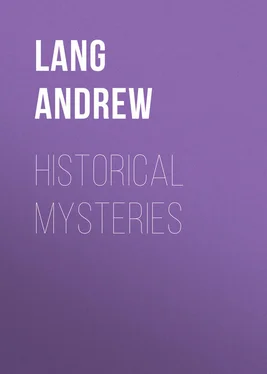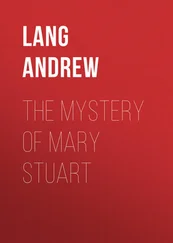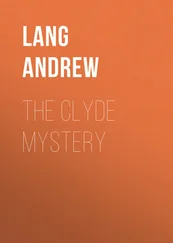Andrew Lang - Historical Mysteries
Здесь есть возможность читать онлайн «Andrew Lang - Historical Mysteries» — ознакомительный отрывок электронной книги совершенно бесплатно, а после прочтения отрывка купить полную версию. В некоторых случаях можно слушать аудио, скачать через торрент в формате fb2 и присутствует краткое содержание. Жанр: foreign_antique, foreign_prose, на английском языке. Описание произведения, (предисловие) а так же отзывы посетителей доступны на портале библиотеки ЛибКат.
- Название:Historical Mysteries
- Автор:
- Жанр:
- Год:неизвестен
- ISBN:нет данных
- Рейтинг книги:5 / 5. Голосов: 1
-
Избранное:Добавить в избранное
- Отзывы:
-
Ваша оценка:
- 100
- 1
- 2
- 3
- 4
- 5
Historical Mysteries: краткое содержание, описание и аннотация
Предлагаем к чтению аннотацию, описание, краткое содержание или предисловие (зависит от того, что написал сам автор книги «Historical Mysteries»). Если вы не нашли необходимую информацию о книге — напишите в комментариях, мы постараемся отыскать её.
Historical Mysteries — читать онлайн ознакомительный отрывок
Ниже представлен текст книги, разбитый по страницам. Система сохранения места последней прочитанной страницы, позволяет с удобством читать онлайн бесплатно книгу «Historical Mysteries», без необходимости каждый раз заново искать на чём Вы остановились. Поставьте закладку, и сможете в любой момент перейти на страницу, на которой закончили чтение.
Интервал:
Закладка:
'Ealing; April 14, 1753.
'His Grace the Duke of Newcastle.'
' Endorsed : Ealing, April 14th, 1753
Mr. Fielding.
R. 16th.'
'My Lord Duke, – I am extremely concerned to see by a Letter which I have just received from Mr. Jones by Command of your Grace that the Persons concerned for the Prosecution have not yet attended your Grace with the Affidavits in Canning's Affair. I do assure you upon my Honour that I sent to them the moment I first received your Grace's Commands, and having after three Messages prevailed with them to come to me I desired them to fetch the Affidavits that I might send them to your Grace, being not able to wait on you in Person. This they said they could not do, but would go to Mr. Hume Campbell their Council, and prevail with him to attend your Grace with all their Affidavits, many of which I found were sworn after the Day mentioned in the Order of Council. I told them I apprehended the latter could not be admitted but insisted in the strongest Terms on their laying the others immediately before your Grace, and they at last promised me they would, nor have I ever seen them since.
'I have now again ordered my Clerk to go to them to inform them of the last Commands I have received, but as I have no Compulsory Power over them I cannot answer for their Behaviour, which indeed I have long disliked , and have therefore long ago declined giving them any advice, nor would I unless in Obedience to your Grace have anything to say to a set of the most obstinate fools I ever saw, and who seem to me rather to act from a Spleen against my Lord Mayor, than from any motive of Protecting Innocence, tho' that was certainly their motive at first . 3 3 My italics. Did Fielding abandon his belief in Elizabeth?
In Truth, if I am not deceived, I suspect that they desire that the Gipsey should be pardoned, and then to convince the World that she was guilty in order to cast the greater Reflection on him who was principally instrumental in obtaining such Pardon. I conclude with assuring your Grace that I have acted in this Affair, as I shall on all Occasions, with the most dutiful Regard to your Commands, and that if my Life had been at Stake, as many know, I could have done no more. I am, with the highest Respect,
'Ealing; April 27, 1753.
'His Grace the Duke of Newcastle.'
Endorsed : 'Ealing: April 27th, 1753.
Mr. Fielding.'
II
THE MURDER OF ESCOVEDO
'Many a man,' says De Quincey, 'can trace his ruin to a murder, of which, perhaps, he thought little enough at the time.' This remark applies with peculiar force to Philip II. of Spain, to his secretary, Antonio Perez, to the steward of Perez, to his page, and to a number of professional ruffians. All of these, from the King to his own scullion, were concerned in the slaying of Juan de Escovedo, secretary of Philip's famous natural brother, Don John of Austria. All of them, in different degrees, had bitter reason to regret a deed which, at the moment, seemed a commonplace political incident.
The puzzle in the case of Escovedo does not concern the manner of his taking off, or the identity of his murderers. These things are perfectly well known; the names of the guilty, from the King to the bravo, are ascertained. The mystery clouds the motives for the deed. Why was Escovedo done to death? Did the King have him assassinated for purely political reasons, really inadequate, but magnified by the suspicious royal fancy? Or were the secretary of Philip II. and the monarch of Spain rivals in the affections of a one-eyed widow of rank? and did the secretary, Perez, induce Philip to give orders for Escovedo's death, because Escovedo threatened to reveal to the King their guilty intrigue? Sir William Stirling-Maxwell and Monsieur Mignet accepted, with shades of difference, this explanation. Mr. Froude, on the other hand, held that Philip acted for political reasons, and with the full approval of his very ill-informed conscience. There was no lady as a motive in the case, in Mr. Froude's opinion. A third solution is possible: Philip, perhaps, wished to murder Escovedo for political reasons, and without reference to the tender passion; but Philip was slow and irresolute, while Perez, who dreaded Escovedo's interference with his love affair, urged his royal master on to the crime which he was shirking. We may never know the exact truth, but at least we can study a state of morals and manners at Madrid, compared with which the blundering tragedies of Holyrood, in Queen Mary's time, seem mere child's play. The 'lambs' of Bothwell are lambs playful and gentle when set beside the instruments of Philip II.
The murdered man, Escovedo, and the 'first murderer,' as Shakespeare says, Antonio Perez, had both been trained in the service of Ruy Gomez, Philip's famous minister. Gomez had a wife, Aña de Mendoza, who, being born in 1546, was aged thirty-two, not thirty-eight (as M. Mignet says), in 1578, when Escovedo was killed. But 1546 may be a misprint for 1540. She was blind in one eye in 1578, but probably both her eyes were brilliant in 1567, when she really seems to have been Philip's mistress, or was generally believed so to be. Eleven years later, at the date of the murder, there is no obvious reason to suppose that Philip was constant to her charms. Her husband, created Prince d'Eboli, had died in 1573 (or as Mr. Froude says in 1567); the Princess was now a widow, and really, if she chose to distinguish her husband's old secretary, at this date the King's secretary, Antonio Perez, there seems no reason to suppose that Philip would have troubled himself about the matter. That he still loved Aña with a constancy far from royal, that she loved Perez, that Perez and she feared that Escovedo would denounce them to the King, is M. Mignet's theory of the efficient cause of Escovedo's murder. Yet M. Mignet holds, and rightly, that Philip had made up his mind, as far as he ever did make up his mind, to kill Escovedo, long before that diplomatist became an inconvenient spy on the supposed lovers.
To raise matters to the tragic height of the Phædra of Euripides, Perez was said to be the natural son of his late employer, Gomez, the husband of his alleged mistress. Probably Perez was nothing of the sort; he was the bastard of a man of his own name, and his alleged mistress, the widow of Gomez, may even have circulated the other story to prove that her relations with Perez, though intimate, were innocent. They are a pretty set of people!
As for Escovedo, he and Perez had been friends from their youth upwards. While Perez passed from the service of Gomez to that of Philip, in 1572 Escovedo was appointed secretary to the nobly adventurous Don John of Austria. The Court believed that he was intended to play the part of spy on Don John, but he fell under the charm of that gallant heart, and readily accepted, if he did not inspire, the most daring projects of the victor of Lepanto, the Sword of Christendom. This was very inconvenient for the leaden-footed Philip, who never took time by the forelock, but always brooded over schemes and let opportunity pass. Don John, on the other hand, was all for forcing the game, and, when he was sent to temporise and conciliate in the Low Countries, and withdraw the Spanish army of occupation, his idea was to send the Spanish forces out of the Netherlands by sea. When once they were on blue water he would make a descent on England; rescue the captive Mary Stuart; marry her (he was incapable of fear!); restore the Catholic religion, and wear the English crown. A good plot, approved of by the Pope, but a plot which did not suit the genius of Philip. He placed his leaden foot upon the scheme and on various other gallant projects, conceived in the best manner of Alexandre Dumas. Now Escovedo, to whom Don John was devotedly attached, was the soul of all these chivalrous designs, and for that reason Philip regarded him as a highly dangerous person. Escovedo was at Madrid when Don John first went to the Low Countries (1576). He kept urging Philip to accept Don John's fiery proposals, though Antonio Perez entreated him to be cautious. At this date, 1576, Perez was really the friend of Escovedo. But Escovedo would not be advised; he wrote an impatient memorial to the King, denouncing his stitchless policy ( descosido ), his dilatory, shambling, idealess proceedings. So, at least, Sir William Stirling-Maxwell asserts in his Don John of Austria : 'the word used by Escovedo was descosido , "unstitched."' But Mr. Froude says that Philip used the expression, later, in reference to another letter of Escovedo's which he also called 'a bloody letter' (January 1578). Here Mr. Froude can hardly be right, for Philip's letter containing that vulgar expression is of July 1577.
Читать дальшеИнтервал:
Закладка:
Похожие книги на «Historical Mysteries»
Представляем Вашему вниманию похожие книги на «Historical Mysteries» списком для выбора. Мы отобрали схожую по названию и смыслу литературу в надежде предоставить читателям больше вариантов отыскать новые, интересные, ещё непрочитанные произведения.
Обсуждение, отзывы о книге «Historical Mysteries» и просто собственные мнения читателей. Оставьте ваши комментарии, напишите, что Вы думаете о произведении, его смысле или главных героях. Укажите что конкретно понравилось, а что нет, и почему Вы так считаете.












